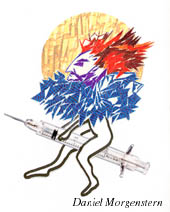On November 6, 2000, American President Bill Clinton signed into law
the Needlestick Safety and Prevention Act. This "Act" could herald a
new era of protection for the nation's 8 million healthcare workers.
The law requires that healthcare facilities implement the use of
"safer medical devices" to minimize accidental needlesticks. For
Dispomedic this requirement now presents a "once in a lifetime
opportunity". The timeliness for marketing the product for the newly
mandated market of safety syringes has created an immense business
opportunity.
In an interview held next to one of the production lines of the
sparkling new factory located in a modern building in the Rotem
Industrial Park, Barry Berler, Dispomedic's President could barely
contain his enthusiasm. "The market that we address, is so great that
even as we add an additional production facility on the Caspian Sea,
we will only be able to supply a small part of the demand of the US
market. He pointed out that healthcare workers themselves will now
play an important role in choosing safety devices that offer superior
protection and ease of use. "Never has there been a better time to
introduce protection at the point of injection into the workplace!
Our unique hypodermic safety syringe, CoverTip™, is a wise and
affordable investment in protective technology." he stated.
In the case of syringes, for the last few years, the "state of the
art" has been to us a no risk retracting needle so that there is no
possibility of injury to the needle user. The needle simply retracts
back up inside the hard plastic shell where the medicine, for
example, was contained. The syringe with the needle inside the
housing is then disposed of. This type of needle requires no change
in the user's grip and only one hand for use. Beside's Dipsomedic's
CoverTipTM there are several products on the market.
The Product
Selling in the American and other Markets
The Price May be the Limit
Dispomedic safety syringes are being tested in 25 hospitals in the US
and five hospitals in the Ukraine.The price is 4 to 8 times more then
standard syringes. "at present and we hope to reduce the price in the
future closer to the price of standard syringes", states Mr. Berler.
The Market
Conservative estimates suggest that as many as 80% of needlestick
injuries could be prevented with the use of safer needle devices.
The cost of needlestick injuries is staggering. According to the
American Hospital Association, one case of serious infection by
bloodborne pathogens, can soon add up to $1 million or more in
expenditures for testing follow-up, lost time and disability
payments. The cost of follow-up for a high-risk exposure is almost
$3,000 per needlestick injury even when no infection occurs.
The annual market size for syringes is generally calculated at 10
times a country's population. For example, in the US, a 1% market
share could exceed 100 million syringes.
Becton-Dickinson, America's leading syringe producer, supplies 70% of
the syringe market: $2.0 billion annual figure is generally agreed
upon for the total US market. for all types of sharps. Most of its
sales are in conventional syringes. Medisys Technologies CEO Kerry
Frey is prepared to do battle with the giant Becton-Dickinson as are
others who are aiming at the safety syringe market. He has said "that
an opportunity exists for large companies to potentially enter into
the safety syringe business by acquiring a company like ourselves".
 Though its initial productive capacity represents only a miniscule
fraction of the $2.0 billion US market for medical safety syringes.
Dispomedic is confident that its patented and FDA cleared CoverTip™
passive injection systems, will allow it to carve out a profitable
market niche, for its product.
Though its initial productive capacity represents only a miniscule
fraction of the $2.0 billion US market for medical safety syringes.
Dispomedic is confident that its patented and FDA cleared CoverTip™
passive injection systems, will allow it to carve out a profitable
market niche, for its product.
Dipsomedic's CoverTipTM is said to have all of the above qualities and
to possess superior advantages as compared with products currently in
the marketplace as well as others about to be introduced.
Dispomedic's innovative technology is in its automatic sheath
mechanism. As the plunger is fully depressed, a protective sheath is
activated and slides down the shaft of the needle, blunting and
isolating the needle tip before it is withdrawn from the patient.
There is no extra user intervention required to activate the safety
mechanism and no manual manipulation with protective cover sheathing
the used needle. The risk of personal injury and disease transmission
is significantly minimized and prevents the reuse of the syringe.
Mr. Berler harbors no illusions about Dispomedic marketing its
products in the US. Instead it the company concentrates on research &
development and manufacturing. In January 2000 Dispomedic entered
into a multi-phase, proprietary agreement with Medisys Technologies
Inc. (SCEP:OTC) to manufacture th CoverTip™ for this American company.
Dispomedic longer term goal is to reduce its price closer to standard
syringe prices.. A leading hospital in Israel pays NIS 92.22 for a
packet of 1000 of 2cc regular syringes, or about $0.02and $0..04 for
standard 10cc syringes.
The need for a safety syringe was never in dispute. Authoritative
healthcare studies carried out in the US reveal that American health
care workers (HCWs) suffer between 600,000 and one million injuries
from conventional needles and sharps annually. These exposures can
lead to hepatitis B, hepatitis C and Human Immunodeficiency Virus
(HIV), the virus that causes AIDS. More than 20 other infections can
be transmitted through needlesticks, including: tuberculosis,
syphilis, malaria and herpes.